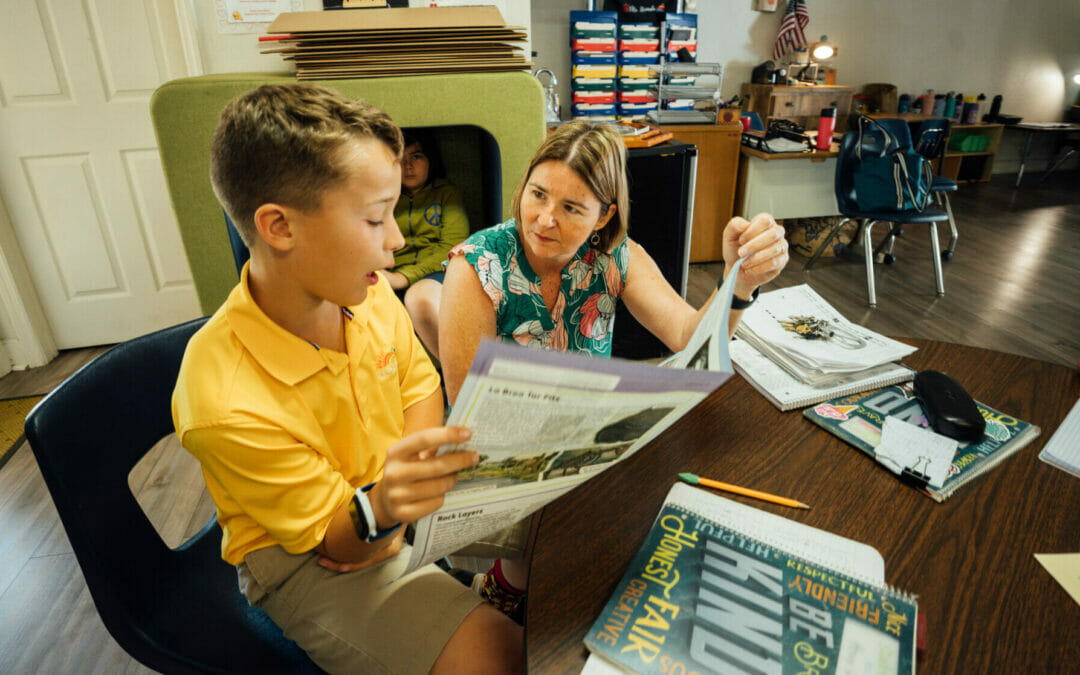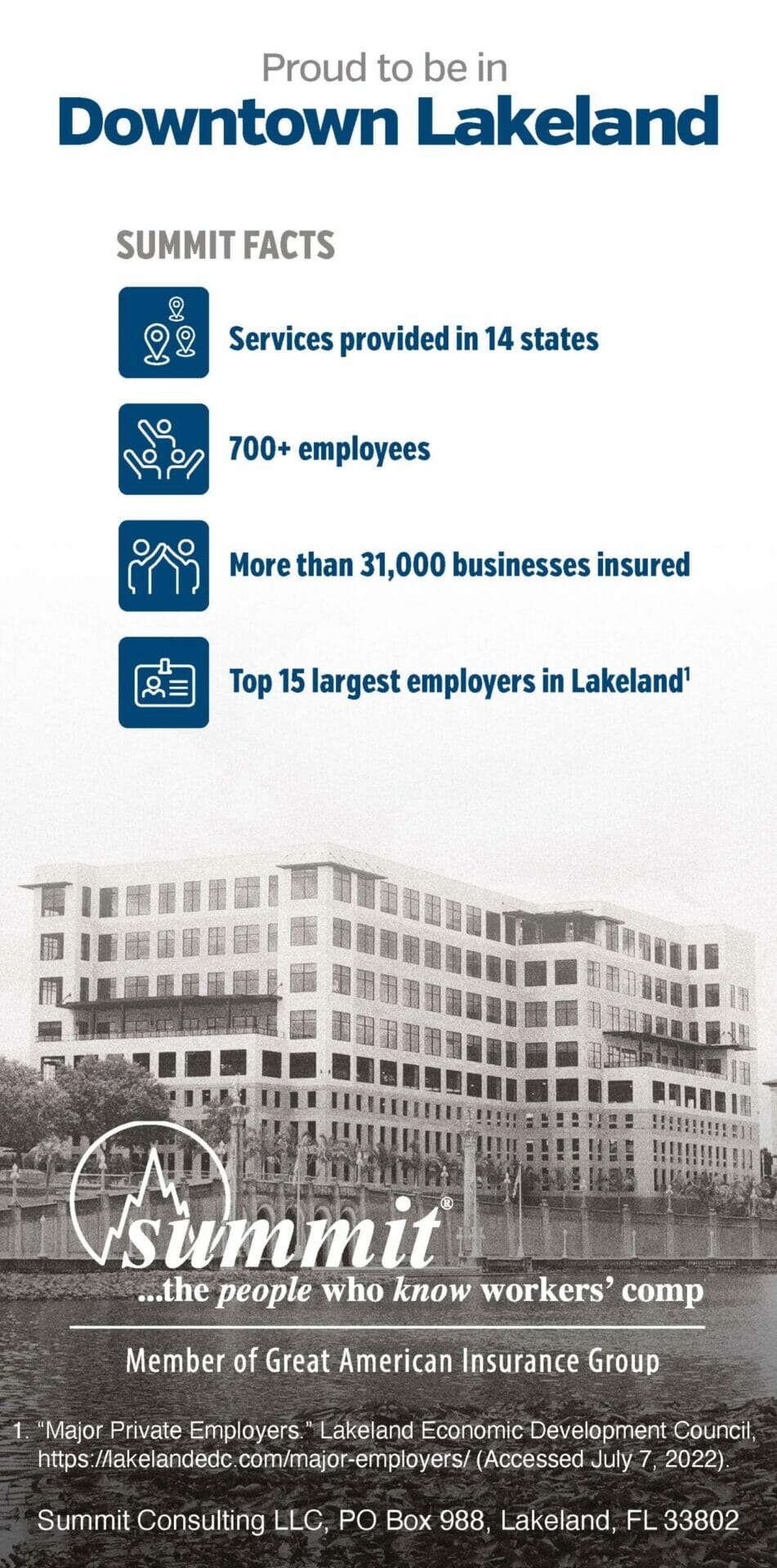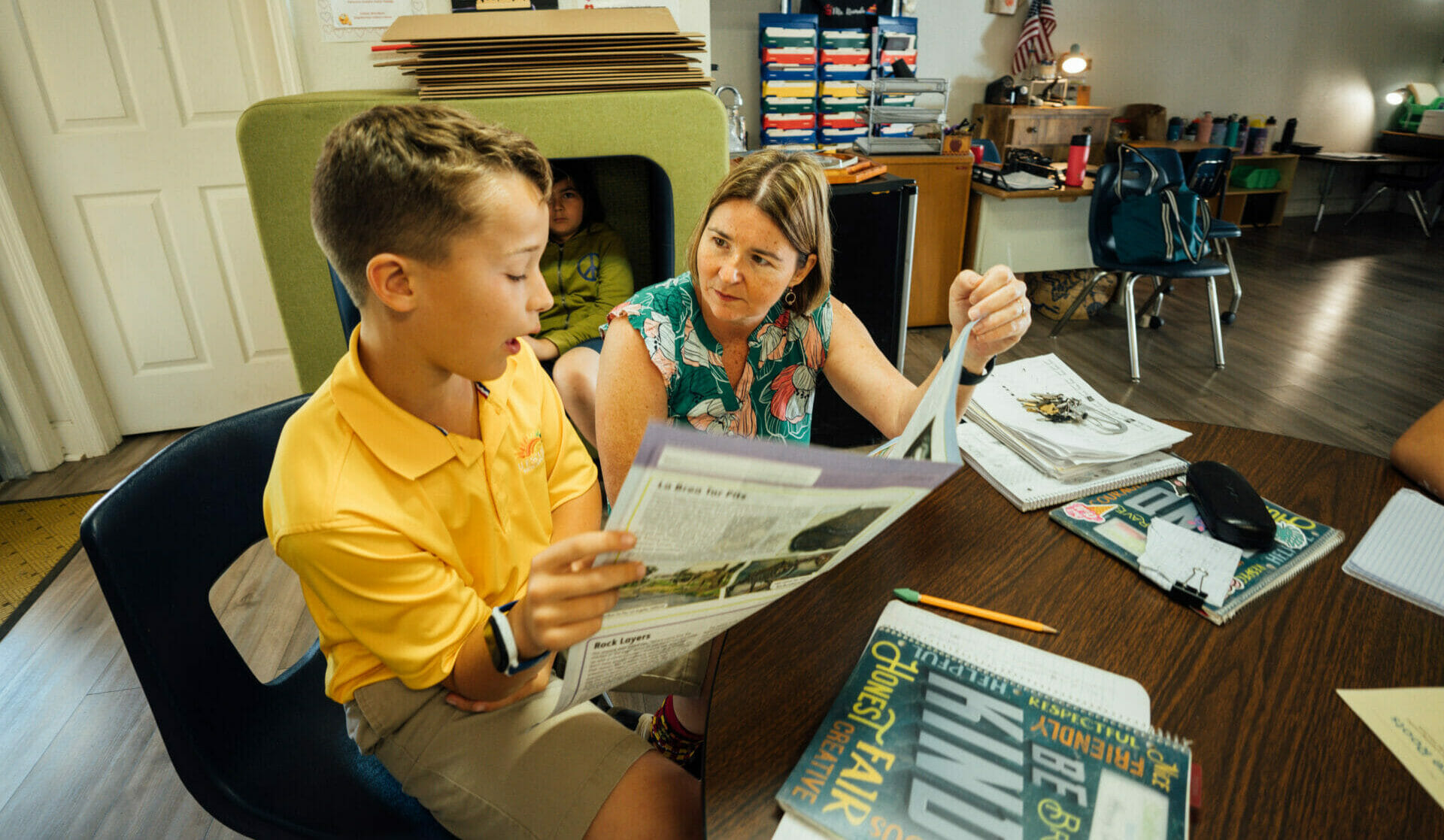
The New Language of Learning: Inside the Bilingual World of Mi Escuela Montessori
By Rj Walters
Photography by Jordan Randall
AColombian flag hangs on a cement block wall, colorful counting beads are neatly organized on racks around the room and small groups of students spanning up to three grade levels in each class are spread out on rugs where they are having spirited, but congenial educational conversations. Other kids are tucked comfortably into corners—deep in thought and harnessing books, a notebook and writing utensils—and teachers are bringing key points home on white boards and through engaging discussions.
Mostly you hear Spanish dialogue, sometimes you hear students switch to English, but no matter what classroom you peek into there is a remarkable sense of camaraderie and cultivated independence that creates an immersive and flexible learning environment.
Watching a 3rd-grader help a 2nd-grader work through a lesson in a secondary language is the norm at Mi Escuela Montessori, a school of more than 280 students located at the corner of County Road 540A and U.S. Highway 98.
“The teachers in the classroom are not just the teachers. The children are teachers as well,” said Kelly De La Cruz, Mi Escuela’s executive director and the visionary who went all in to get a charter approved and finally open in 2021 one of only a handful of public bilingual Montessori schools in the entire country. “Especially when you nurture that in them.”
For the 2023-24 school year, Mi Escuela will offer preschool through 6th grade, and in 2024 the school plans to add 7th and 8th grade. Preschoolers are fully immersed in Spanish and K-6 students are immersed in Spanish nearly 50% of the time. It is the evolution and refinement of something so unique that inevitably it takes teacher’s, student’s—and yes, parent’s—long-term buy-in and patience to see the fruits of the self-directed, dual language experience.
“The teachers in the classroom are not just the teachers. The children are teachers as well,” said De La Cruz
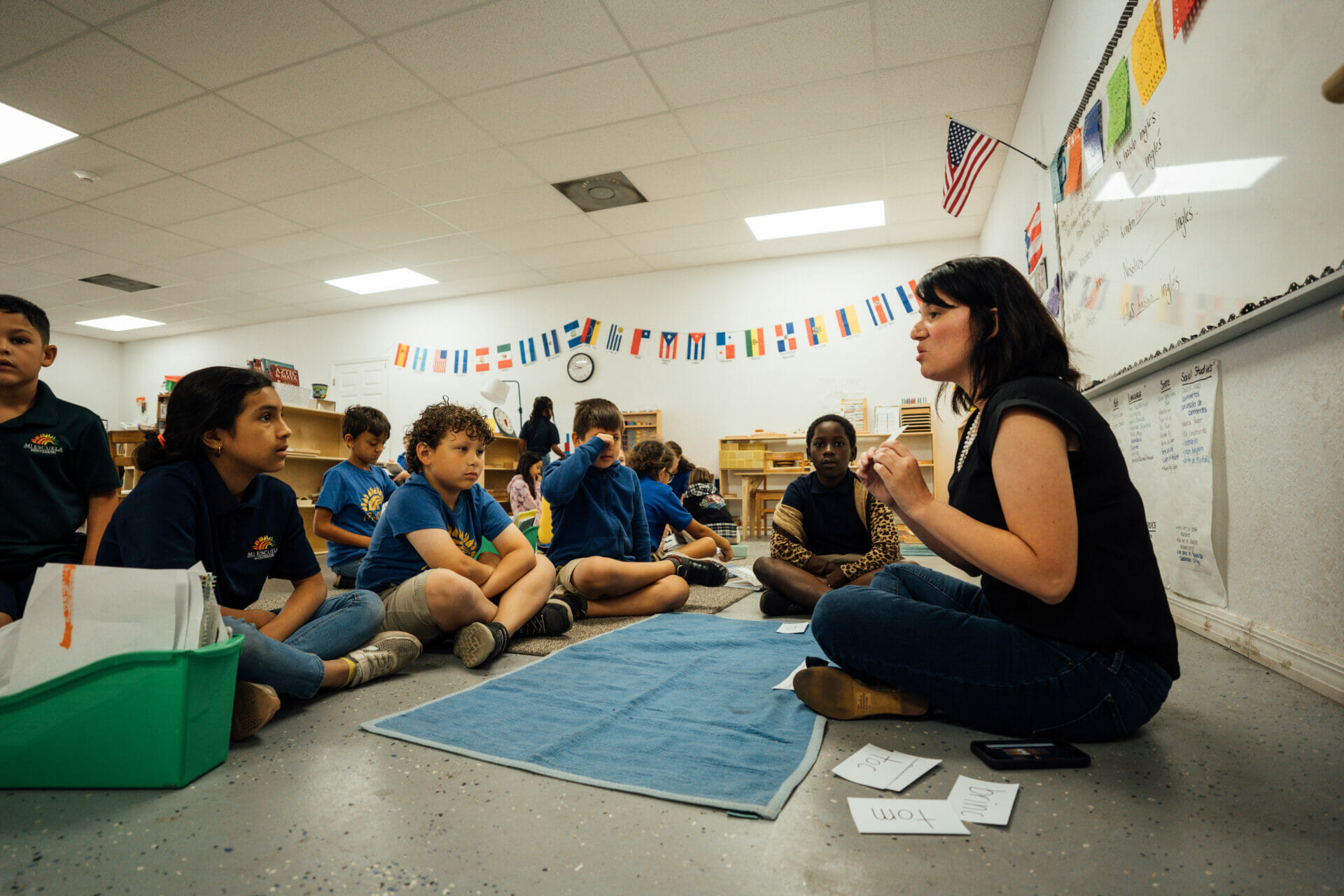
Accessible and Advantageous
De La Cruz has long had a strong desire to open a Montessori school that was accessible to all, to push back against the reality that many people see the more than 100-year-old learning approach as “a form of education for the elite.”
Kindergarten and up is free, aside from afterschool programs. The sponsor of the school charter is Polk County Schools, so Mi Escuela receives per-pupil funding each year through the state.
Enrollment for students prior to kindergarten is tuition based, but the school has a strong partnership with the Early Learning Coalition of Polk County, who offers resources to help families apply for income-based scholarships through the School Readiness program.
After families apply for a student to enroll in Mi Escuela, they are placed in a computerized lottery, which truthfully any student in the state of Florida can opt in to.
De La Cruz said the school also offers some private scholarships, and she is motivated to connect with more partners to make Mi Escuela truly accessible for all because she believes so strongly in its benefit to kids and the community at large.
Notable research studies from around the world continue to tout the benefits of being bi-lingual, including better memory retention, more self-control, stronger vocabulary, and an article in the February 2022 issue of the journal “Neurobiology of Aging” even offered evidence it can protect against dementia.
Montessori philosophy is built on a foundation of fostering self-directed growth with a goal of nurturing children’s natural desires for knowledge, understanding and respect.
De La Cruz acknowledges that some children’s brains may develop better in a traditional classroom setting, but for the most part the Montessori method wonderfully equips children to become independent thinkers and prepare for life as a young adult and beyond.
“When you think of your work day…you do not go to work and have your boss say to you, ‘For the next 45 minutes you are going to read this report and answer these questions, and then I’m going to ring a bell, and it doesn’t matter where you’re at but you’re going to stop and then you’re going to go into the next thing,’” she said. “We give kids the opportunity to manage their day and also to be leaders really young…because whether you are 8, 18 or 48 years old, you have knowledge to share with your community.”
We have teachers who come in on weekends to practice giving lessons in a different language and teachers who dedicated their summers to becoming Montessori certified,” said De La Cruz
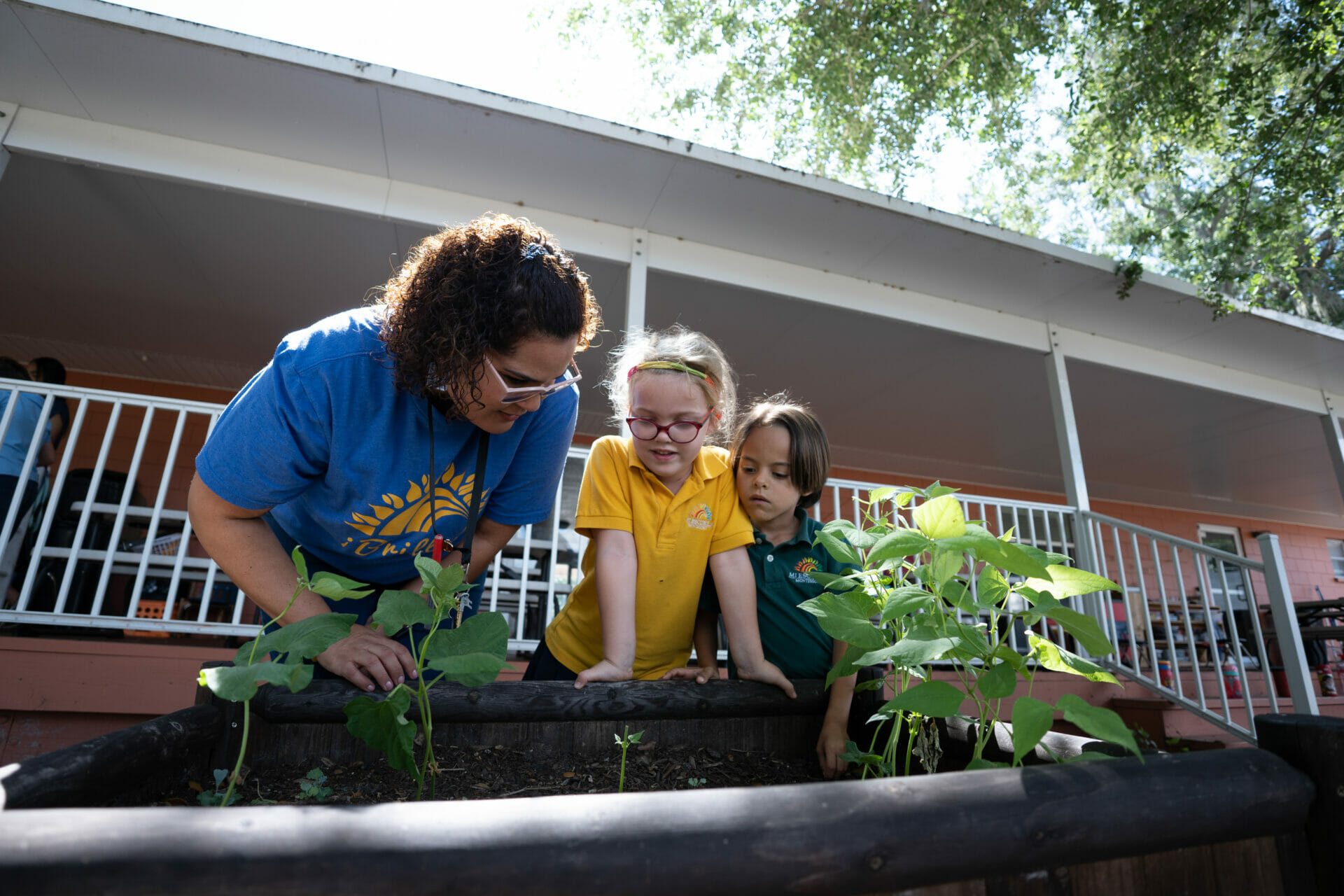
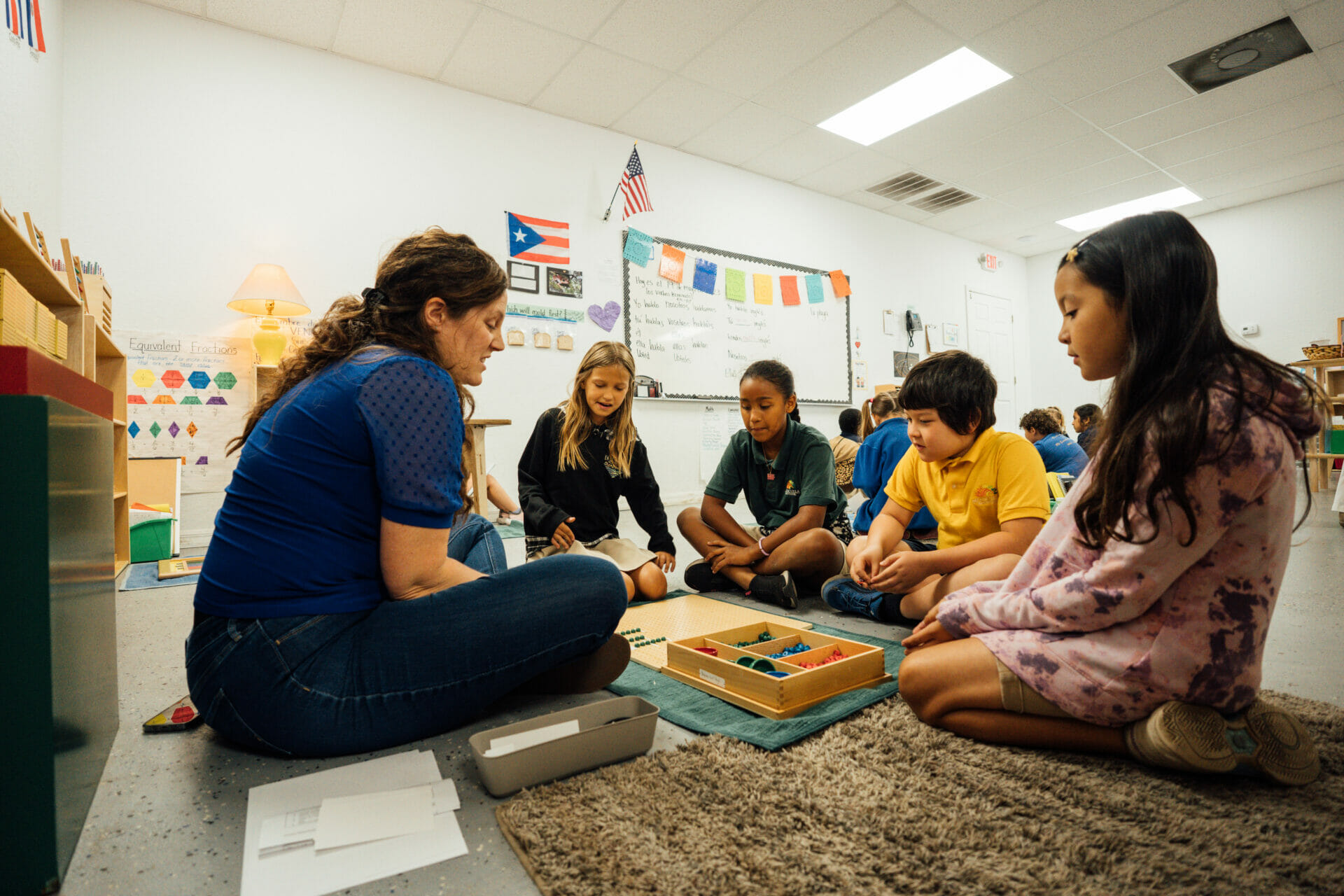
“There is a student who will be in kindergarten next year, and [when he came to us] he was dysregulated and could not control his body, he could not focus on any kind of work,” she said. “And now he’s entering kindergarten as a reader and he is able to sit down at a table and take a task from one point all the way through to completion,” said De La Cruz
A Dream for All
De La Cruz’s dream for this school is deeply personal; she taught at Lakeland Montessori for eight years, she is married to Milton De La Cruz, who is from the Dominican Republic, and she has experienced time and again the advantage and beauty of young people being bi-lingual, especially in Polk County, where at least 27% of residents were Hispanic as of 2022.
She recalls years ago when her daughter, Sophia, now 21, took a 6th-grade Spanish class, and for the first-time in her life she could hold a substantive conversation with her paternal grandmother.
“My mother-in-law stepped out onto the patio with me, and she burst into tears,” De La Cruz said. “She said, ‘I’m so, so happy. I always thought that I would never get to share my stories with my grandchildren because none of them speak Spanish.’”
She believes every student should have their culture affirmed and to have an educational experience that includes a broader vision of the world, and she’s more than willing to pour herself into making that a reality.
A student once gave De La Cruz a hand drawn photo that was an illustration of “Miss Kelly” in a hard hat. The artwork was metaphorical but accurately represented reality.
To make the school come to life, volunteers and staff turned over a building that had sat vacant for six to seven years, teachers were hired and some had to be trained in Montessori, and De La Cruz did not have an assistant principal during the inaugural school year. She was working 14-15 hour days for many months and said it became normal to come in before sunup and leave long after sundown.
She and her family also donated funds for the large wooden playground that is on site, hauled countless loads of mulch and constructed the playsets.
De La Cruz said one of the greatest blessings is that the teachers at the school mirror her passionate dedication.
“When you’re creating something…figuring out how to make all of the parts move all over the place and how to train all of the different players in different roles is really challenging,” she said. “But all of my teachers came in with grit, like they know it’s going to be hard, but we’re going to get this done and do it together. We have teachers who come in on weekends to practice giving lessons in a different language and teachers who dedicated their summers to becoming Montessori certified.”
Just the Beginning
One intrinsic challenge to starting this kind of school is that it can take years to build a strong instructional understanding and language comprehension for kids. A school is truly “fully implemented” when kids who began in kindergarten are now in the highest grade.
De La Cruz said realistically it takes people five to seven years to speak a language effectively, so it’s helpful for parents, students and interested onlookers to understand a grade of “I” for incomplete is most appropriate when currently evaluating the school.
She proudly states that the school already has a “very robust special education program” and they are adding a resource room for the upcoming school year.
De La Cruz said the school’s long-term growth and impact on the community will directly correlate with community influencers and business partners’ willingness to share wisdom and resources with the students, encouraging them about the benefits of being bi-lingual and culturally aware.
While it’s the broad vision that pushes De La Cruz to strive for excellence every day, it’s the specific victories that keep her going.
“There is a student who will be in kindergarten next year, and [when he came to us] he was dysregulated and could not control his body, he could not focus on any kind of work,” she said. “And now he’s entering kindergarten as a reader and he is able to sit down at a table and take a task from one point all the way through to completion.”

